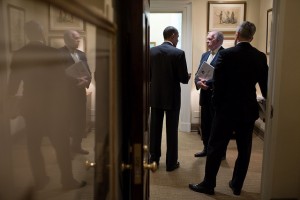Khan’s Protests Succeed: US Halts Use of Northern Supply Route Through Pakistan
Recall that two weeks ago, John Brennan launched a drone strike in a settled area of Pakistan (rather than the remote tribal areas where most strikes take place) in the very province ruled by drone critic Imran Khan’s PTI party. Last week, Khan retaliated, with his party behind an attempt to break the cover of the CIA station chief in Islamabad. Khan also launched massive demonstrations aimed at disrupting the NATO supply route that runs through Khyber Pakhtunkhwa. Yesterday, the Pentagon announced that use of that route for removal of equipment from Afghanistan is being halted until it once again becomes safe for the drivers of the trucks.
Reuters was first to bring news of the interruption:
The affected route, which runs from Torkham Gate at the Afghanistan-Pakistan border to the Pakistani port city of Karachi, has been crucial for the United States as it winds down its combat mission in landlocked Afghanistan and moves equipment out of the country.
The route accounts for the vast majority of ground traffic of U.S. military cargo through Pakistan and has been targeted by protesters in Pakistan angered by U.S. drone strikes.
“We are aware protests have affected one of the primary commercial transit routes between Pakistan and Afghanistan,” Pentagon spokesman Mark Wright told Reuters.
“We have voluntarily halted U.S. shipments of retrograde cargo … to ensure the safety of the drivers contracted to move our equipment,” he added, referring to shipments going out of Afghanistan.
The article notes that an alternative land route that goes through Russia and central Asia is longer and more expensive. Although shipments of supplies, especially fuel, into Afghanistan are still needed to maintain troops in Afghanistan, Wright’s statement is strangely silent on whether supply shipments via the northern route in Pakistan also have been halted. Considering that PTI activists armed with clubs have been stopping trucks to inspect their cargo to see if it is related to the troops in Afghanistan, drivers of supply shipments should be just as much at risk as those bringing equipment out of the country.
Khan’s party was quick to claim victory today:
PTI spokeswoman Shireen Mazari hailed the Pentagon’s move as a “tactical success” and said the protests would continue.
“The US decision to halt Nato supplies through Torkham doesn’t affect our protest and we will continue our protest until drone strikes are stopped,” she told news agency AFP.
Khan demanded the government block Nato supplies after a US drone strike that killed Pakistani Taliban leader Hakimullah Mehsud but Islamabad has shown no appetite for such a move.
Believing that this interruption will be brief, the US has called for the transport trucks to wait in holding areas in Afghanistan. Will these holding areas be the sites of the next “tactical success” for opponents of US policy?
With regard to the equipment being shipped out of Afghanistan, note that I had already commented on the move by the US away from the MRAP and to purchase nearly a billion dollars’ worth of new armored vehicles for Afghan military forces. Although many vehicles are being shipped out of the country, many more are simply being destroyed in Afghanistan. If the disruption of the transport route becomes prolonged, look for even more vehicles to be destroyed rather than removed. That process may have already started, however. While traveling last weekend, I happened to overhear a conversation on an airplane in which one party claimed to have been on the ground in Kabul recently to witness brand new MRAP’s arriving by air transport only to be moved across the airport to a site where they were dismantled to be sold as scrap.
Update: Just a few minutes after this post went live, I saw a tweet from ISAFMedia linking to this statement:
While U.S. retrograde and NATO/ISAF cargo are not currently moving through the Torkham Gate in the interest of the safety of the drivers, shipments continue to move into – and out of – Afghanistan via alternate routes.
So it appears that supplies also are not being shipped into Afghanistan via the northern route through Pakistan, just as I had speculated. My guess is that Wright emphasized the retrograde shipments merely to make the point that the disruption could slow US withdrawal.

